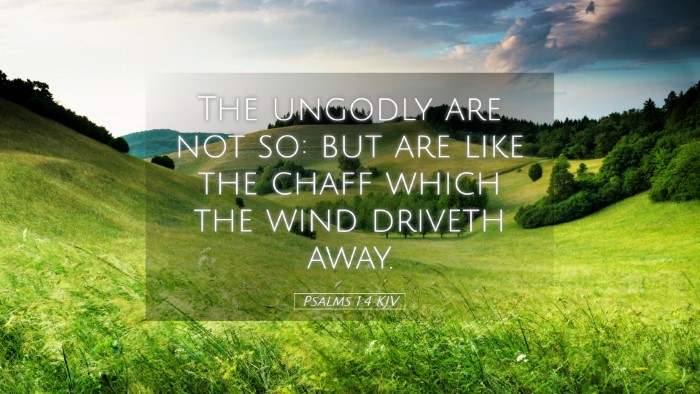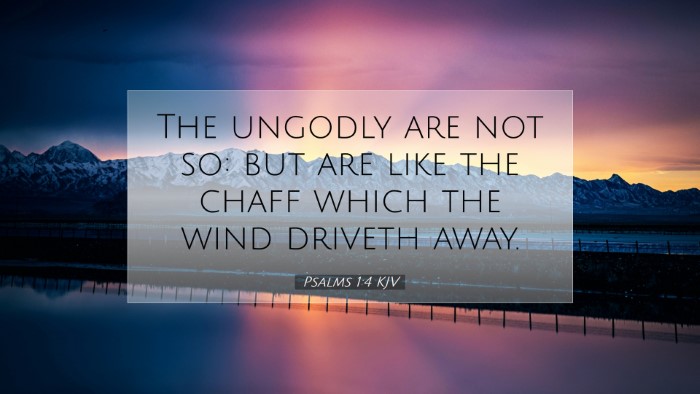Bible Commentary on Psalms 1:4
Psalms 1:4 states, "The wicked are not so: but are like the chaff which the wind driveth away." This verse compares the destiny of the wicked with that of the righteous, emphasizing the instability and ultimate futility of their lives. In this commentary, insights from various public domain sources such as Matthew Henry, Albert Barnes, and Adam Clarke will be synthesized to provide a thorough examination of this significant passage.
Contextual Overview
The entire first Psalm serves as a profound introduction to the Book of Psalms, contrasting the righteous and the wicked. In the preceding verses, the righteous man is described as one who meditates on the law of the Lord day and night and bears fruit in due season. This sets a stark juxtaposition against the fate of the wicked, which is examined in verse four.
Verse Analysis
1. The Unstable Nature of the Wicked
Matthew Henry notes that the term "wicked" refers to those who are actively opposed to God's ways. The imagery of "chaff" is significant; unlike wheat, which has substance and purpose, chaff is light, insubstantial, and easily blown away by the wind. This metaphor illustrates the lack of foundation and permanence in the lives of the wicked, highlighting their moral and spiritual instability.
2. The Consequences of Wickedness
Albert Barnes elaborates on the consequences of wickedness. He points out that the "wicked" are not to be taken lightly; their character and actions lead to their eventual demise. Chaff, being a byproduct of the wheat-threshing process, has no value and is discarded. Barnes argues that Psalm 1:4 communicates that the wicked will ultimately face judgment and are destined to face consequences as they lack true worth in the eyes of God.
3. The Role of Divine Judgment
Adam Clarke emphasizes the divine aspect in the metaphor of chaff. The wind represents God's judgment and power, which drives away the chaff. This indicates that while the wicked may flourish for a season, they are under the impending threat of divine intervention that will sweep them away. This reinforces the overarching biblical theme that God ultimately restores order and righteousness.
Thematic Implications
- Contrast Between Righteousness and Wickedness: The stark difference presented in Psalms 1 illustrates that walking in righteousness leads to life, as opposed to how the wicked face destruction.
- Temporary Success: The apparent success of the wicked may be temporary, akin to the fleeting nature of chaff, emphasizing the need for spiritual discernment.
- Hope for the Righteous: For believers and the righteous, the promise is that they bear fruit, are rooted, and are established, assuring them of God's favor and protection.
Lessons for Pastors and Theologians
For pastors and theologians, Psalms 1:4 serves as a poignant reminder of the importance of teaching about the consequences of moral and spiritual choices. It encourages the faithful to remain steadfast and meditate on God's law.
1. Spiritual Foundation: Emphasizing the importance of remaining grounded in God's Word provides a strong foundation for congregations. Teaching the dichotomy of the righteous and the wicked can lead to a deeper understanding of one's spiritual path.
2. The Nature of Judgment: This verse can be a critical point in discussions about divine judgment and grace, reminding followers of Christ that their choices bear eternal consequences.
3. Encouragement in Trials: Pastoral care can be enriched by understanding that the righteous may sometimes suffer or feel marginalized. They can find solace in the certainty that their fate is secure in God's plan, unlike the wicked.
Conclusion
Psalms 1:4 encapsulates a profound truth regarding the nature of wickedness and righteousness. The succinct but powerful imagery of chaff highlights the fate of those who choose a path opposed to God. Through the insights gained from Matthew Henry, Albert Barnes, and Adam Clarke, this verse not only serves as a warning but also offers hope to the righteous. It beckons believers towards a life rooted in the Word of God, promising flourishing amidst a world where the wicked may seem to thrive. Therefore, as we reflect on this passage, may we be reminded to choose the way of the Lord, ensuring our lives bear fruit and withstand the winds of judgment.


